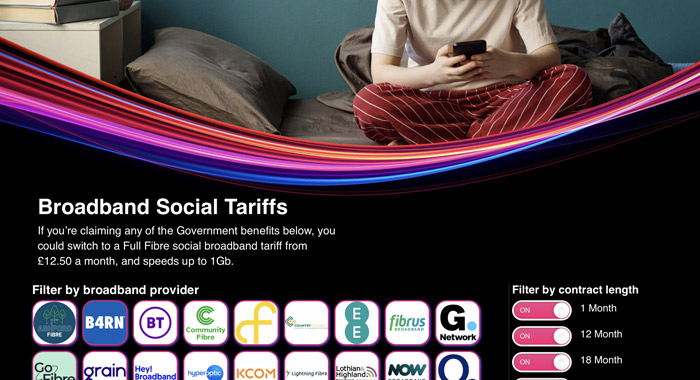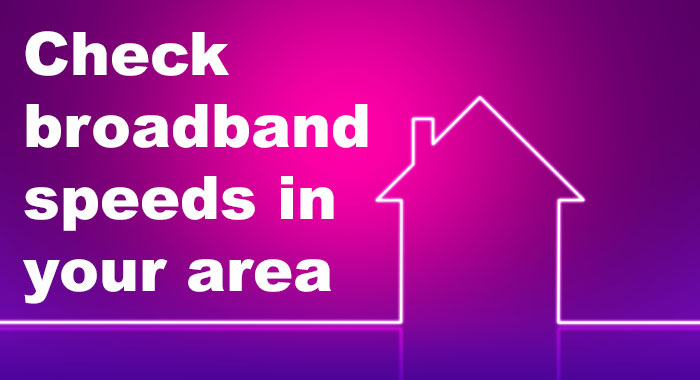- £60 Gift card
- 5G Home Broadband
- Three
- 24 month contract
Broadband Know-How Since 2007
Expert insights, practical tips, and self-help broadband support to save you time and money

Broadband social tariffs
If you’re on benefits such as Universal Credit, you could be eligible for a social broadband tariff with speeds up to 1000Mb for just £15 a month from providers like B4RN. These low cost deals are often overlooked. Check if you’re eligible and compare.
Broadband social tariffs

Broadband in your area
Check broadband speeds and availability at your address using accurate street level data. Enter your postcode and select your property to see available broadband types and realistic speeds. Ideal for home movers, renters, and upgraders.
Check your address

Paying loyalty tax?
Out of contract and paying more than you expected? You could be paying a loyalty tax to your current provider. It’s time to switch and take advantage of new customer deals. Enter your postcode, and let One Touch Switch handle the move for you.
Broadband deals
Top Broadband Deals for March 2026
Offer ends in 3 hours

- £145 Voucher
- Full Fibre 500
- Sky
- 24 month contract
Average customer speed: The speeds shown reflect the typical download speeds experienced by at least 50% of customers during peak hours (8pm to 10pm), based on real world data. Speeds can vary due to factors like location, broadband type, home setup, and the number of connected devices. Use our broadband postcode checker to find the best broadband deals and speeds in your area.
Essential Broadband Switching Guide
Everything you need to know before switching broadband provider
The broadband market in the UK is highly competitive, with providers constantly changing their prices and promotions. The best broadband deals are usually targeted at new customers, so staying on the same plan after your contract ends can mean paying more than you need to.
Haggling and switching broadband
A good first step is to phone your current broadband provider’s customer retention team to see if they can offer you a better deal. Before you call, check what competing broadband providers are offering in your area so you’re prepared with accurate comparisons.
We understand that not everyone feels comfortable haggling, especially if you’re not confident with broadband terminology. Conversations with retention teams can sometimes feel pressured or overly sales driven, but don’t let that put you off.
You’re unlikely to be offered the same discounts or incentives available to new customers, such as voucher cards or free gifts. These are typically reserved for new sign ups only. Your current provider might not be able to match those deals, so switching could still be the better option. Be prepared to walk away if the offer doesn’t stack up.
Choosing the right broadband plan
The cheapest broadband package isn’t always the best option. If your needs are limited to basic web browsing and email, it may be more cost effective to choose a mobile broadband plan. However, if you work from home or have a busy household with constant online activity, it’s important to find the fastest broadband provider within your budget. You can check availability by using our broadband comparison tool simply enter your postcode and filter the results by price and speed.
Compare broadband types and speeds in your area
Broadband speeds can vary significantly depending on the types of broadband connection available at your address, your regional location, and your distance from the street cabinet.
We compare broadband speeds in your area along with the types of connection available. The results will display whether ADSL standard broadband, superfast FTTC, or ultrafast FTTP are available at your address, along with the realistic anticipated upload and download speed for your property.
The results can also be a useful guide if you suspect your current broadband speed is lower than it should be. For example, if the checker shows your address is likely to receive up to 150Mb but you’re consistently seeing much slower speeds on a like for like service, it’s worth checking your contract’s minimum guaranteed speed, or discussing the issue with your provider to ensure you’re getting the service you’re paying for.
Broadband social tariffs
Millions of UK households could save up to £200 a year by switching to a broadband social tariff. These discounted broadband packages remain one of the industry’s best-kept secrets.
Millions of UK households could save over £220 a year by switching to a broadband social tariff, according to
Ofcom’s latest Pricing Trends report. These are discounted broadband packages for people on qualifying benefits, but they are still widely missed.
If you receive benefits such as Universal Credit, Pension Credit, or Income Support, you may be able to move onto a discounted broadband tariff from your provider.
Ofcom reports that uptake reached nearly 506,000 customers by June 2024, which is around 9.6% of eligible households, using 5.3 million households claiming Universal Credit as a proxy. In October the same year, Ofcom research found that 69% of eligible adults with fixed broadband had not heard of social tariffs. While the government has encouraged providers to offer social tariffs, they are not required to do so, and availability varies.
The next update to this report is due on 26 February 2026. For more information on eligible and to see what you could save by switching to a social tariffs, visit our dedicated social tariffs support page.
Not all UK broadband providers, but a large number of them. We compare most major national providers, alongside many smaller regional and independent networks. Our postcode checker shows only the broadband services that are actually available in your area, and you can apply filters to narrow the results by speed, contract, best value.
Our broadband comparison tool is independent, and the results are not influenced by paid rankings or commission. By default, results are ranked by best value, but you can change this to prioritise monthly or annual costs whichever suits your needs. All broadband comparisons are based on accurate availability data.
As of February 2026, the providers included in our postcode based results include: 4th Utility, Airband, BeFibre, BeeBu, BRSK, BT, Community Fibre, Cuckoo, Direct Save Telecom, EE, Fibrus, Gigaclear, Go Fibre, Hey Broadband, Hyperoptic, KCOM, Lightspeed, NOW Broadband, One Broadband, Onestream, POP Telecom, Plusnet, Quickline, Rebel Internet, Rise Fibre, Sky, Squirrel, TalkTalk, Three, toob, Trooli, TrueSpeed, Virgin Media, Vodafone, YouFibre, Zzoomm.
We also publish in depth provider reviews and guides, including smaller independent networks that do not provide postcode availability data. These providers may not appear in our postcode checker, but we still review them and include a non commercial link for convenience.
We also compare social broadband tariffs. Discounted broadband plans for people who receive government benefits such as Universal Credit or Pension Credit. These are listed separately and may include smaller providers that don’t appear in the main postcode based results. Our social tariff comparison is a not-for-profit facility and fully impartial. Like all services on FasterBroadband, the information shown is free from sponsored results and not influenced by commission. This is part of our ongoing commitment to supporting digital inclusion and helping to close the digital divide.
Let’s make it clear: the landline isn’t going away; it’s being upgraded. This transition will introduce a new system known as Voice over Internet Protocol (VoIP), which allows phone calls to be made over the internet. You may also hear this technology referred to as a 'Digital Landline' or 'Digital Voice'.
Ditching the Landline: What’s changing and when?
Digital phone lines will use the internet to carry all services, including phone calls, marking a significant shift from traditional analogue networks. Openreach has announced that it will switch off the existing analogue network by 31st January 2027 an extension from the previous deadline. This additional time aims to ensure a smooth migration for all users. As of September 2023, Openreach has stopped selling analogue phone lines to new customers to facilitate this transition.
Will you need an engineer to access your home?
In most cases, upgrading to a digital phone line shouldn’t require anyone to enter your home. Typically, this process can be completed without an engineer visit, especially if you’re simply switching services. However, if you’re also upgrading your broadband or require assistance with your existing phone sockets, your service provider may need to send an engineer to your premises. They will inform you about what this might involve during the transition.
Do you still need a landline?
The necessity of a landline will largely depend on your individual circumstances and preferences. Here are some pros and cons to consider:
Benefits of Digital Voice: Key advantages you should know
Enhanced features: Digital voice services offer additional functionalities, such as voicemail-to-email, call blocking, and compatibility with various devices, enriching the communication experience.
Improved reliability: Users often report improved call quality and fewer dropped calls with digital voice services, which rely on broadband connections rather than traditional copper lines. If you currently use FTTC broadband (fibre to the cabinet), removing the phone line can marginally help stabilise your broadband connection. You may also experience a slight increase in your broadband speed as the line becomes more stable.
Cost effective bundling: Many broadband providers offer competitive packages that include digital voice services, which can be cheaper than maintaining a separate landline service.
Drawbacks of Digital Voice: Key disadvantages to consider
Dependence on broadband: If your internet connection experiences outages, you'll also lose the ability to make or receive calls, including those to emergency services. This may be a concern for those in areas with unreliable broadband. Or, in urban areas where mobile phone signal is patchy.
Power cuts: Unlike traditional landlines that can operate during power failures, digital voice services require power, making them less reliable in emergencies. If this is a concern, a UPS (Uninterruptible Power Supply) can be purchased, which will provide automatic temporary power during a power cut.
Transitioning services: Some consumers may find the shift to a new system daunting, especially if they rely heavily on landline services for daily communication.
Area code requirement for local calls: Under the new system, even local calls will require you to dial the area code, which may feel cumbersome for those accustomed to the old system. This means that calls to friends or family in your local area will involve an extra step, potentially leading to confusion or inconvenience. Additionally, if you use speed dial numbers, you may need to update them to include the local area codes.
Limited landline options: Not all broadband providers are continuing to offer a landline phone service. For example, Plusnet have removed this option for new customers and are now directing customers who still require a landline to BT, their parent company.
How do I get a digital phone line?
For most people, transitioning to a digital phone line will be seamless. If you already have a broadband connection, you’ll need to contact your broadband provider to migrate to ‘Digital Voice.’ Once completed, you can plug your phone directly into your broadband router, and in some cases, your provider may supply an adapter to facilitate this connection. If you have multiple handsets linked to different phone sockets, you may require additional adapters to ensure all your phones remain operational. You can compare the latest broadband deals by entering your postcode into our broadband availability checker above.
Your new or existing ISP (Internet Service Provider) will guide you through the switching process. You can often complete the upgrade without the need for an engineer visit. After signing up for a digital voice service, you’ll be able to enjoy the benefits of VoIP technology, similar to how WhatsApp, and FaceTime audio function.
As of February 2026, 11 internet service providers have voluntarily enrolled in Ofcom's compensation scheme, demonstrating their commitment to ensuring customer satisfaction. The participating providers outlined below are obligated to provide compensation in specific situations, such as when an engineer misses an appointment or when there are delays in activating your broadband service or rectifying a loss of broadband service.
| Issue | You're entitled to compensation if... | Compensation due |
|---|---|---|
| Delayed repair following loss of service | Your phone or broadband service ceases to function and is not adequately restored within two working days. | £9.98 for each day that the service remains unresolved |
| Missed appointments | An engineer fails to attend a scheduled appointment or cancels with less than 24 hours' notice. | £31.19 per missed appointment |
| Delayed start of a new service | Your service is not activated on the agreed-upon go-live date. | £6.24 for each day of delay, including the missed start date. |
The following ISPs are part of the scheme:
1. BT
2. EE
3. Hyperoptic
4. NOW Broadband
5. Plusnet
6. Sky
7. TalkTalk (Customers on the Openreach network only)
8. Utility Warehouse
9. Virgin Media
10. Vodafone (Restrictions apply for Vodafone customers using the Community Fibre network – Read Vodafone T&C's)
11.Zen Internet
This compensation scheme empowers consumers by providing clear guidelines on the circumstances under which they are eligible for compensation, ensuring a fair and transparent process for resolving service-related issues.
Compensation payments are subject to annual adjustments aligned with inflation. Starting from 1 April each year, the adjustments are based on the Consumer Price Index (CPI) as of 31 October in the preceding year. This annual increase will be applicable to any new service-related issues arising from 1 April. The rates in the chart above are for (1st April 2025 - 31st March 2026).
In the event of a simultaneous loss of service for both your landline and broadband, a single compensation payment will be issued by your ISP.

